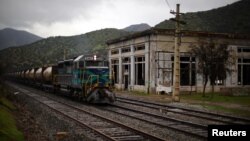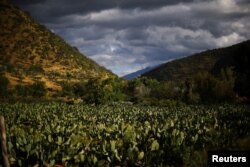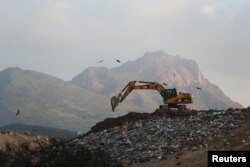The trains seem to never stop.
One after another, they haul more than 12 tons of rubbish daily to the small Chilean community of Til Til, 35 miles (56 km) northwest of Santiago, the equivalent of at least two-thirds of the capital's municipal waste.
This town of 17,000 is the last stop for much of the trash produced by a city of 7 million.
And now there will be more.
The Minister's Committee, a gathering of high-ranking Chilean political officials who decide the fate of controversial projects, last year approved the construction of a sprawling new industrial waste processing facility here.
Already, Til Til, a desert-dry community of yellow hills fringed with cactus fruit farms, has more than 30 industrial projects. Among them: several mining waste sites, a pig farm, a cement plant and Lomas Los Colorados, one of Santiago's largest waste dumps.
With this newly approved facility, operated by Ciclo, a local waste management company, Til Til will become the last stop for more than half the industrial waste produced from northern Chilean mining region of Atacama to Bio Bio province in the south, according to a report from Chile's Congress.
The community has protested, blocking the train tracks that funnel trash north, and Route 5, known locally as the Panamerican Highway and a major trucking thoroughfare that transits the city.
"Why Til Til again? Why must Til Til solve the environmental problems of 8 million inhabitants?," said Til Til Mayor Nelson Orellana on a radio program following the project's approval.
The national committee that approved the project says safeguards have put in place to minimize contamination or impact on townspeople.
Ciclo said that the site is the only one within the greater Santiago region that is "apt and possible" for an industrial waste site of this magnitude.
"There is no health risk for the population," Ciclo says on its website.
The company hopes to see the project begin operation in 2019, according to its promotional materials.
Meanwhile, Santiago's trash problem is only getting worse.
A 2015 fire at another large landfill in Santa Marta - much nearer the city center than Til Til - put citizens here on edge, shrouding Santiago's skyscrapers and crowded streets in toxic dust.
Only 10 percent of the country's trash is recycled, according to Environment Ministry statistics - putting the country near the bottom of Organization for Economic Co-operation and Development(OECD) nations.











